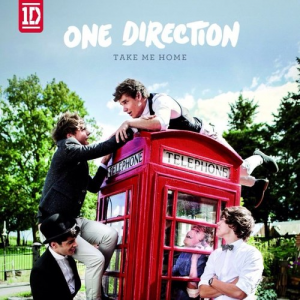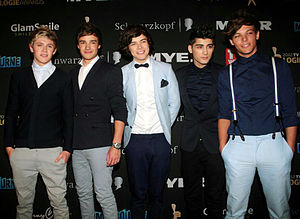 One Direction’s entire schtick: stuff five good-looking, long-haired, well-manicured, too-white-of-teeth-for-British boys into the studio with semi-talented songwriters and let them belt their sweet little hearts out.
One Direction’s entire schtick: stuff five good-looking, long-haired, well-manicured, too-white-of-teeth-for-British boys into the studio with semi-talented songwriters and let them belt their sweet little hearts out.
Watch as millions of screaming girls fawn over the thought of touching even a sleeve of the O-Blessed-Ones’ trendy t-shirts, reveling in their mystique.
Sit-back and take in the ensuing social-media frenzy centered around overly confessional tweets and “When Zayn TOTALLY deleted his twitter account.”
But, and this is the most important step of all, observe as One Direction, Sony Music Entertainment, Billboard, iTunes, and even freaking Simon Cowell, rakes in the cash.
Manufactured pop at its finest.
2011 was, albeit self-proclaimed, “The Year of One Direction.”
Or the year of a “pop-revolution” (whatever that means) in the form of yelping, well-dressed, British baby-faced teens.
In other words, One Direction was astoundingly popular not only in America, but across the Atlantic and every market in-between.
While their boy band aesthetic seems generic, contrived and typical, many a fan girls clamored to their “Up All Night Tour,” and flocked to any city within the vicinity of their tour bus.
One Direction’s first album, “Up All Night,” hit shelves in November 2011. Their debut had admittedly a couple catchy tunes. Between the invaluable hit single “That’s What Makes You Beautiful” and the pretty unspectacular “Gotta Be You,” One Direction sang on a pretty well-crafted, even if uneven and wobbly at times, album.
But “Up All Night” left something to be desired.
Despite what “Directioners” will tell you, their debut wasn’t flawless from front to back. There was too much filler, there was really only one hit single, and, to be completely honest, there was only one truly well-conceived and well-executed song throughout.
So when One Direction went into the studio this year, not only were financial expectations high from Sony, but their artistic “pop-revolution” based expression was as well.
The first single preceding the album, “Live Like We’re Young,” is an up-tempo, surprisingly guitar heavy, bubblegum pop track. The lyrical content doesn’t trek on any type of unexplored intellectual ground and the music isn’t really all that catchy. But the track puts their impressive vocal ranges on display.
Still, the single has sold like hotcakes, and it debuted on the charts at number three.
But between a leak of “Live Like We’re Young,” and a push back in their second album’s release date, the boys have had to confront their fair share of road blocks.
“Take Me Home,” One Direction’s second album, was released in the United States on Nov. 12, 2012.
The opening few tracks are arguably the strongest. A Swedish pop-powerhouse duo made up of Rami Yacoub and Carl Falk lifts relatively simple guitar progressions from the ordinary to the spectacular by injecting a house, dance music back beat.
Ed Sheeran lends his radio savvy song-writing skills on the third track, “Little Things,” an acoustic ballad laced with sweet soaring vocal harmonies and a twinge of British blue-eyed soul.
The LP then takes a turn towards a dance party soundtrack and relegates itself to pure Swedish house-infused magic. Not because it is cleverly written or composed, but because these Swedes know how to jump on a fad and manipulate an audience to maximize profits.
The rest of the album utilizes only one formula: nice, slow developing verses made up of shimmering, confessional solo vocals. Those tender moments soon make way for a synth build-up into the chorus, where a filtered snare smash signifies the climax to the song in the most cheesy way possible. The slow moving stomp throughout the rest of the chorus helps pin the song down long enough for it not to float away due to its empty, hot-aired center.
The album finishes with the band-penned “Summer Love,” a sparse, minimalist take on their usually overly-indulgent sound.
“Take Me Home,” is a mild disappointment. It has all of the parts to keep it interesting to their fan base, but it lacks any serious hit that can transcend their boy-band bravado and garner attention from serious music enthusiasts or anyone over the age of 16.
But “Take Me Home” isn’t a serious misfire. It’s calculated and well-manufactured pop.
And there’s an emphasis on the manufactured part.
Most people will look at One Direction as just a product of the “music business machine.”
And they are.
But what self-righteous indie-rockers fail to understand is that One Direction isn’t meant to be some sort of deep, emotionally visceral, intellectually stimulating brood.
They are supposed to be five kids having a good time. As lame as that sounds.
So yes, their lyrics are short-sighted and superficial.
And yes their music is predictable and generic.
But they aren’t claiming to be some sort of musical enigma meant to save the pop-music industry from itself by introducing the youth of America to “good music.”
So when people go looking for things that aren’t there, like lyrical depth and complexly written music, it isn’t just naïve, it’s moronic. That just isn’t their goal in the first place.
The new, self-appointed musical conscious of the twenty first century, the indie music scene, just doesn’t understand that. The people who love Grizzly Bear, Real Estate, Beach House, or any other aptly named housing organization are failing to miss what is so great about pop music: The ability of a song to be catchy, powerful, beautiful and still make tons of money.
And not at the expense of musical integrity.
But rather because of their ability to avoid constantly thinking about musical integrity.
They don’t focus on being so counter-culture. They don’t try to turn convention on its head for the sake of being “different” and they don’t avoid hooks, catchy chord progressions and, yes I’ll say it, fun.
They are unpretentious and unabashedly mainstream.
The mainstream is changing and for the better. A movement has begun, trying to shift all pre-existing pop into accessible, mature and most importantly, serious adult and music enthusiast friendly music.
And One Direction is spearheading that movement.

